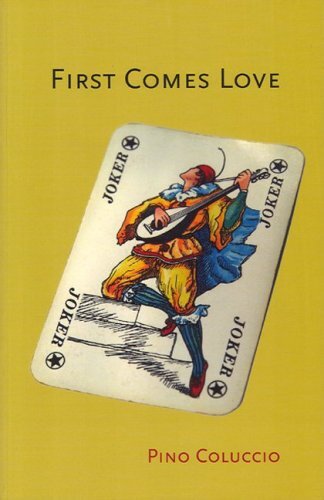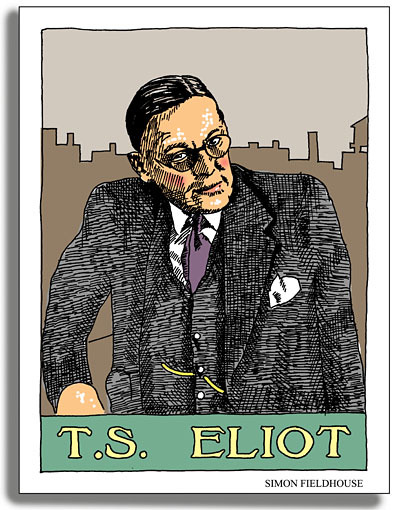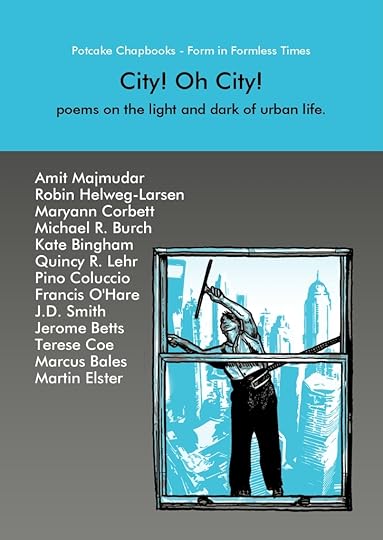Robin Helweg-Larsen's Blog, page 54
October 12, 2022
Potcake Poet’s Choice: Pino Coluccio, ‘First Comes Love’

There comes a time when sitting home alone
looking at your life — I’m such a knob —
gets to be a drag. You hate your job,
your car’s a piece of crap, and what you eat
is fatty, fried and salty. But then you meet
a girl. The life you made a mess of pulses.
And not content to mess up just your own,
you settle down and mess up someone else’s.
*****
Pino Coluccio writes that this poem is one his personal faves. It’s from his first book, also titled ‘First Comes Love‘, published by Mansfield Press. His poem ‘City Sunsets’ is featured in the most recent Potcake Chapbook, ‘City! Oh City!‘
Pino Coluccio lives in Toronto.
October 10, 2022
Short poem: ‘North American Fall’

The red leaves in the sunshine are
So red! So red! So red!
There are no buried Caesars here – instead,
The dispossessed of all the Earth,
With native wisdoms, human worth,
Bleed through the trees like a reopened scar.
*****
Today is Canadian Thanksgiving; in the US, Columbus Day; in the Bahamas, National Heroes Day; in all of them “aka Indigenous Peoples’ Day”. Yes, we’re all here, across the Atlantic or the Pacific from where we or our ancestors came. Yes, there are things to be thankful for, and things to regret. But that’s the story of modern humans, walking out of Africa for the past 200,000 years, and of earlier versions walking out of Africa for the previous couple of million years.
Reparations for everything done to each other is impossible… will the Italians pay reparations to the British for 300 years of occupation and slavery? (Not that the reparations would be paid to the English, who didn’t show up until after the Romans left; payment would be to the people the English pushed out: the Welsh, Cornish, some Irish and maybe some Scots…) People have been invading and massacring, invading and enslaving, invading and intermarrying, in all parts of the world since forever.
What would be reasonable would be for all governments to grant all citizens good quality universal education and good quality universal health care at least for the first 20 years of life. Reparations to the dead may be impossible, but giving everyone a decent chance going forward would seem appropriate. And it would be in the interests of everyone who would like a healthy, well-educated society in which to live.
“Fall Colors at Lake Sabrina in the Eatsern Sierra” by RS2Photography is licensed under CC BY-NC-ND 2.0.
October 8, 2022
Double Dactyl: ‘Emily Dickinson’

Yellow rose, yellow rose,
Emily Dickinson
lived in seclusion, was
never a wife;
wrote of her garden most
anthropocentrically,
talking with God, Satan,
Death, all her life.
*****
There’s an old suggestion that all of Emily Dickinson’s poetry can be sung to the tune of ‘The Yellow Rose of Texas’.
I never saw a moor,
I never saw the sea;
Yet know I how the heather looks,
And what a wave must be.
(Brave words, but I think that waves would have surprised her with their complexity and power and sensuousness.) There’s a newer suggestion that she lived so reclusively because she suffered from epilepsy, and wanted to hide it as much as possible out of a sense of shame.
Strange woman, strange life, strange little poems… but remarkably insightful, accessible, and word-for-word memorable.
My double dactyl on her was recently published in The Asses of Parnassus – thanks, Brooke Clark!
“Emily Dickinson” by Amherst College Archives is marked with Public Domain Mark 1.0.
October 5, 2022
Sonnet: ‘The Arrogance of Youth’

How fortunate the arrogance of youth—
the optimism and innumeracy,
lack of experience, perspective, truth—
giving hopes, visions that they’d never see
if they but knew the small chance of success
in major league politics, business, sports.
Most fail, adopt some wage-slave form of dress
that not dreams, but a family, supports.
Without those early dreams, with a clear view
of stats on making it in the Big Time,
they’d all give up, seeing how very few
truly succeed. Then we’d miss those sublime
insane few dreamers who can win their race,
make the discoveries, blast into space.
*****
This Shakespearean sonnet has just been published in Shot Glass Journal – thanks, Mary-Jane Grandinetti!
Photo: “Arrogance” by De kleine rode kater is licensed under CC BY-NC-ND 2.0.
October 3, 2022
Nina Parmenter: ‘The Quantum Fox’

Have you seen the quantum fox,
the fox in flux, the paradox?
His whereabouts is rare, because
he’s in his den, and in this box.
This hokum locus tends to vex
the best of us; the mind rejects
the concept of his flightiness
as fiction or as foxy hex.
But fiction’s just refocused facts –
a lens that bends, a parallax.
The fact remains that Foxy lacks
a fix, til someone interacts.
See, should you pry inside the box,
you’ll find a fox, or not a fox,
and then this quantum nonsense stops
and everything is orthodox.
*****
Nina Parmenter writes: “I love reading ‘Quantum Fox’ out loud because it’s one of the few poems of mine I reliably know by heart and if performing it, I read it with props (er, a fox and a box funnily enough). Sometimes I also recite it to myself to distract my brain if it’s overheating! It’s one of the older poems in my book ‘Split, Twist, Apocalypse‘ (relatively – written around 2019 I think) and I can’t remember where the inspiration came from – I think it was just the nice feel of the words ‘Quantum Fox’!”
Nina Parmenter has no time to write poetry, but does it anyway. Her work has appeared in Lighten Up Online, Snakeskin, Light, The New Verse News, Ink, Sweat & Tears, and the Potcake Chapbook ‘Houses and Homes Forever’. Her home, work and family are in Wiltshire.
https://ninaparmenter.com/
“Fennec fox in box” by Joel Abroad is licensed under CC BY-NC-SA 2.0.
October 1, 2022
Short poem: ‘When Your Flesh Freshly’

When your flesh freshly and your face flushly
Face the imperatives of flesh,
I find your mind now unleashed lusty-lushly…
Must we not then enmesh?
*****
This little poem was triggered by pondering the nearness to each other of the words fresh, flesh and flush, and jamming them all together. The result was coherent enough for publication in (naturally) ‘Rat’s Ass Review‘ – thanks, Rick Bates!
Photo: “The Redhead Piano Bar” by Thomas Hawk is licensed under CC BY-NC 2.0.
September 28, 2022
Parody poem: Marcus Bales, ‘Slash Wednesday’

I
Because I do not do the limerick line
Because I do not do
Because I do not do the limerick
Desiring this man’s schtick or that man’s joke
I will stick to knocking out free verse
(If here and there a rhyme so much the worse)
In mournful moans
Presented ragged-right upon the page.
II
There once was a Lady with three
White leopards, a juniper tree,
And a bag full of bones
That sang their sad moans
Of what they had once hoped to be.
III
At every turning of the turning stair,
Your breathing hard, your eyesight edged with dark,
You see the face of hope and of despair.
You breathe the vapor of the fetid air
And toil as if some atmospheric shark
At every turning of the turning stair
Was hunting through the gathering darkness there,
While back and forth across the narrative arc
You see the face of hope and of despair.
At every turning there’s a window where
You contemplate a drop that’s still more stark
At every turning of the turning stair.
Instead you circle upward as you swear
Like you are looking for a place to park.
You see the face of hope and of despair.
You can’t endure the future’s dismal dare
Nor drag yourself to put out your own spark
At every turning of the turning stair.
You’re learning how to care and not to care
And whether you will make or be a mark.
You see the face of hope and of despair
At every turning of the turning stair.
IV
Higgledy piggledy
Here we are all of us
Trudging along where some
Billions have trod
Smelling the flowers and
Trusting religionists’
Tergiversational
Rodomontade.
V
If the word that is lost isn’t lost,
And the word that is spent isn’t spent
Then silence is actually speaking,
And meaning is something unmeant.
If the meaning is what is unheard
And the word is the thing that’s unspoken
Then how do you hear if a word
Has a meaning that hasn’t been broken.
If the unspoken word must be still
And the unheard is what it’s about
To have heard the unhearable meaning
The inside has got to be out.
If the unheard were out of this world
And the light shone in darkness were dark
Then the unlit unheard would be meaning
If the snuffer provided the spark.
If the yadda can yadda its yadda
And the pocus was what hocus took
Then gobble must surely be gobble
Though dee separates it from gook.
VI
Awake! Your hope to turn or not to turn
Is wasting time – but go ahead and yearn
To see the light or hear the word to know
A heaven human beings can’t discern.
There’s nothing there for such as you and me;
We make our meaning up from what we see
And hear and touch and taste and smell and think —
But all there is is fragments and debris.
The steps are just the steps, the stairs the stairs,
The rest is merely human hopes and prayers
That do no more than hopes and prayers can do,
And nothing’s chasing you except your heirs.
No unmoved mover writes upon some slate
That mortals may abate or not abate;
No hope and no despairing of that hope
Reveals what nothing states, or doesn’t state.
Whatever happens happens because of us
We get a muss when we don’t make a fuss
Demanding right from wrong not mere convenience:
We’re all complicit underneath this bus.
Awake! Don’t hope to turn or not to turn,
Don’t pray that this is none of your concern.
Awake! What will it take for you to learn
That if it all burns down you, too, will burn?
*****
Marcus Bales has produced this wonderful set of parodies of the long T.S. Eliot poem ‘Ash Wednesday‘, beginning with a piece in the poem’s style for Part I,
Because I do not hope to turn again
Because I do not hope
Because I do not hope to turn
Desiring this man’s gift and that man’s scope
but then moving into a limerick for Part II’s
Lady, three white leopards sat under a juniper-tree
and a 22-line villanelle for Part III’s
At the first turning of the second stair
and a double dactyl for Part IV’s
Who walked between the violet and the violet
and quatrains for Part V’s
If the lost word is lost, if the spent word is spent
If the unheard, unspoken
Word is unspoken, unheard;
and finally rubaiyat with a strong flavour of FitzGerald’s Omar Khayyam for Part VI’s
Although I do not hope to turn again
Although I do not hope
Although I do not hope to turn
‘Ash Wednesday‘ has proved one of Eliot’s best-known and most quoted poems, with its signature mixture of Christian mysticism, personal emotion, loose form and scattered rhyme, rich imagery and memorable wordplay. Bales’ ‘Slash Wednesday‘ is an appropriate tour de force of a back-handed homage, mocking Eliot’s ragged rambling with a sampling of forms that could have been used (inappropriately) instead.
Not much is known about Marcus Bales except that he lives and works in Cleveland, Ohio, and that his work has not been published in Poetry or The New Yorker. However his ’51 Poems’ is available from Amazon. He has been published in several of the Potcake Chapbooks (‘form in formless times’).
This is being posted two days late for T.S. Eliot’s birthday, but as it’s for the already late T.S. Eliot that shouldn’t matter too much…
Photo: “File:T S Eliot Simon Fieldhouse.jpg” by Simon Fieldhouse is licensed under CC BY-SA 3.0.
September 26, 2022
Launch: Potcake Chapbook 12, ‘City! Oh City!’

City! Oh City! – poems on the light and dark of urban life. Thirteen of the best contemporary English-language poets present their wildly differing takes on the glamour and squalor, the joy and heartbreak, the varied people and the hidden wildlife of our modern cities.
Five of the poets are new to the Potcake Chapbook series, and I’m delighted to be adding Kate Bingham of England, Francis O’Hare of Northern Ireland, Pino Coluccio of Canada, and Quincy R. Lehr and J.D. Smith of the US. They join eight returning poets. Amit Majmudar and Maryann Corbett deserve special mention for their brilliant use of form to capture contradictory situations: Majmudar’s static street scene which suddenly changes pace to a hectic chase, Corbett’s interwoven Baroque chamber ensemble and homeless encampment with their separate realities in a shared evening in Saint Paul, Minnesota. In addition: Michael R. Burch, Jerome Betts, Terese Coe, Marcus Bales, Martin Elster and myself; everyone contributes to this memorable capture of the complexity of the modern city.
Bios, photos and links to read more of their work can all be found on the Sampson Low site’s Potcake Poets page, while all the chapbooks in the series, showing which poets are in which, are here. Each of the 12 chapbooks is profusely illustrated (of course) by Alban Low, and can be yours (or sent as an intriguing gift) for the price of a coffee.
Value the city – citification is civilisation!September 24, 2022
Poem: ‘Some Fling Away’

Some fling away
Some stay and cling—
Each their own Way
To do their own thing.
Sacrifice meaning
For love of the rhyme;
Know that in dreaming
You make up the time.
Sacrifice meaning—
When thought becomes sight
Your soul from its mole-hole
Blinks into life-light.
*****
An early poem, from when I was searching for meaning and questioning the various Meanings that were presented. Decades later, I feel the answer to the meaning of everything is best expressed by Leonard Cohen at the end of Tower of Song. That, and by John Cleese in the photo’s poster, and Douglas Adams’ “42”. Do your own thing, indeed; and keep dreaming and rhyming.
‘Some Fling Away’ was first published in ‘Metverse Muse‘ in India.
“Do Your Own Thing” by mikecogh is licensed under CC BY-SA 2.0.
September 21, 2022
Poem: ‘Homage From British Expats’

Thou noble, purest British race!
Thy children we,
Inheriting thy every trace;
From thy straight back, unmoving face,
We learn the truest social grace,
Pomposity.
To thee the new is never good,
’Tis duty shirked.
Thou’dst never think, and much less brood;
Thou duty-bound eatst wooden food;
Thou ever ramrod-straight hast stood,
And never worked.
Britain! Served on a silver tray
Thine Empire’s tea –
Respectfully we beg to say
We praise thee, but we cannot stay,
We have our duty far away,
Escaping thee.
*****
This is the third of the poems recently published by Pulsebeat Poetry Journal, and I’m pleased at how different the three of them are. ‘Ultimate Control’ is a Science Fiction sonnet, ‘Ticking Away’ is a meditation on time, life and death, and this one was written almost 50 years ago in reaction against (some aspects of) being sent to boarding school in England.
A little personal context: I was raised as an expat in the Bahamas by my Danish father and English mother. After five years of Church of England primary boarding school in Jamaica (when at least I came home three times a year) I went to England for five more years of boarding school, and came home rarely. The countryside setting of Stowe was delightful, and I got a good education with a lot of poetry, and I learned sarcasm. It all uprooted me from being fully Bahamian, but failed to make me fully English. In the 1970s the Bahamas didn’t want me and I didn’t want England. So… Denmark, then Canada, then the US, and finally the Bahamas again as a foreign resident. I have been an expat all my life – and frequently sarcastic about it.
The poem is a nonce form – I used to produce them easily in my 20s, I wish I still did. It’s in iambics rhyming ABAAAB, with four feet to the A lines and only two to the B lines – the last line of each verse being a punch line and the shortness of the line helping strengthen that effect.
“Image” by spock-ola is licensed under CC BY-NC-SA 2.0.



